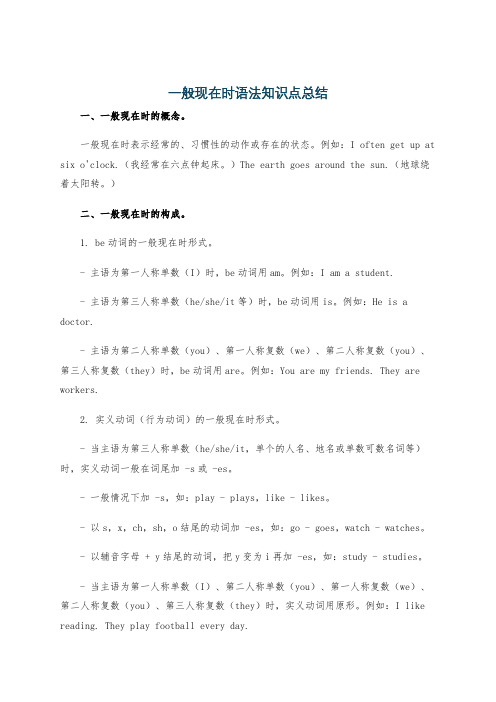实义动词的一般现在时
- 格式:ppt
- 大小:173.00 KB
- 文档页数:24

【导语】⼀般现在时,是⼀种语法形式。
表⽰通常性、规律性、习惯性、真理性的状态或者动作有时间规律发⽣的事件的⼀种时间状态。
那么在英语学习中⼀般现在时中含有实义动词的⼀般现在时如何变成否定句呢,⽆忧考给⼤家介绍的⼀般现在时中含有实义动词的句⼦,在变否定句前要分两种情况,不清楚的同学赶紧来看看!
第⼀种:如果主语是第三⼈称单数时,要在实义动词前加doesn't,后⾯的动词⽤原形。
具体是怎样的呢,我们通过⼏个例句来了解下:
1.He doesn't eat an apple. 他不吃苹果
2.Jim doesn't do his homework.吉姆没有做作业
3.Wang doesn't go to school.⼩王没去学校
第⼆种:如果主语不是第三⼈称单数时,只需在实义动词前加don't.具体是怎样的呢,我们通过⼏个例句来了解下:
1.I don't teach English.我不教英语
2.They don't go to school.他们没有去学校
3.We don't sing a song. 我们没有唱歌
好了,通过以上的⼏个例句,⼤家是否了解了含有be动词的⼀般现在时变成否定句的情况呢?
那么,接下来我们做⼏道题测试下你掌握得如何?
将下列句⼦改成否定句;
1. I like Jinan.
2.We go to school on Sunday.
答案:
1. I don't like Jinan.
2.We don't go to school on Sunday.。


一般现在时的结构和用法
一、一般现在时的结构
1.谓语为be动词(am/is/are)的一般现在时:
结构:主语+ be(am/is/are) + 表语(形容词、名词充当表语)
否定式:主语+ be(am/is/are) + not + 表语(形容词、名词充当表语)
疑问句:Be(am/is/are) + 主语+ 表语(形容词、名词充当表语)?
2.谓语为实义动词(及物动词或不及物动词)的一般现在时:
当主语为第三人称单数时:主语+ 动词第三人称单数形式+ 其他当主语为非第三人称单数时:主语+ 动词原形+ 其他
否定式:
当主语为第三人称单数时:主语+ doesn't + 动词原形+ 其他
当主语为非第三人称单数时:主语+ don't + 动词原形+ 其他
疑问句:
当主语为第三人称单数时:Does + 主语+ 动词原形+ 其他?
当主语为非第三人称单数时:Do + 主语+ 动词原形+ 其他?
特殊疑问句:特殊疑问词+ 一般疑问句?
二、一般现在时的用法
1.描述习惯性或经常性的动作:如“I usually go to bed at 11 pm.”
2.表达客观事实或普遍真理:如“The sun rises in the east.”
3.描述时间表或日程安排:如“The train leaves at 8 am.”
4.在新闻报道或科技文章中描述当前状况:如“The company is developing a new product.”。

一般现在时一般现在时主要表示经常发生的动作或存在的状态。
一、一般现在时的形式:1、Be动词的一般现在时:主语+be动词(am ,is ,are)例子:I am a boy and she is a girl.am:第一人称单数is:第三人称单数are:第一、二、三人称复数,第二人称复数2、实义动词的一般现在时:主语+动词原形例子:He reads the book.I go to school by bus.My father likes reading newspaper.当主语是第三人称单数时,动词要发生相应地变化:(1)、一般动词:词尾+s例子:listen---listens speak---speaks work---works play---plays (2)、以s,x,o,ch,sh结尾的动词:词尾加es例子:pass—passes fix---fixes go—goes teach---teaches wash---washes (3)、以“辅音字母+y”结尾的动词:把最后的“y”改成“I”再加“es”例子:study—studies fly—flies cry---cries dry---dries二、一般现在时的用法1、表示经常性、习惯性的动作或存在的状态2、表示普遍真理、科学事实、格言等不受时间限制的客观存在练习:一、写出下列动词的第三人称单数talk______ forget______ hope______ stop_____perform______ play______ say______ buy______ worry______ fly______ study_______ like_______ make______ take______love_______ recite_______ become_______ come_______ drive_______ shine_______leave_____ wake_______ ride_______ write_______ hike______give______ see______ swim______ stop______ shop_______ plan______ get______ sit_______ let_______ cut_______run_______ forget_______ begin_______ wash_____ watch_______ finish______ teach_____ fish_______ reach_______ go_______ do_____二、用括号内动词的适当形式填空。

实义动词的词形变化一.原形(do)1.一般现在时(用于非单数第三人称)例如 We know him.2.情态动词后例如 I can swim.3.助动词后例如 She doesn’t like swimming.Does she like eggs ?4.祈使句首例如 Stand up ,please.5.固定句型例如 Let me watch TV.二.单数第三人称(does)1.一般现在时。
(he ,she ,it 或它们代替的词)例如 He has a cat .She enjoys watching TV.I t often rains .This desk has four legs .2.表示猜测Who knows the answer ?三.不定式(to do)1句型want to do sthwould like to do sthdecide to do sthit is time to do sthask sb to do sthtell sb to do sth2两个动作之间例如 I can come to see you.四.现在分词(doing)用于现在进行时中例如 She is watching TV.五.动名词(doing)1.标题:Unite 8 Playing games.2.作主语:Running is good for you.3.介词后:I want some water after running.4.固定句型:She enjoys watching TV.。



一般现在时语法知识点总结一、一般现在时的概念。
一般现在时表示经常的、习惯性的动作或存在的状态。
例如:I often get up at six o'clock.(我经常在六点钟起床。
)The earth goes around the sun.(地球绕着太阳转。
)二、一般现在时的构成。
1. be动词的一般现在时形式。
- 主语为第一人称单数(I)时,be动词用am。
例如:I am a student.- 主语为第三人称单数(he/she/it等)时,be动词用is。
例如:He is a doctor.- 主语为第二人称单数(you)、第一人称复数(we)、第二人称复数(you)、第三人称复数(they)时,be动词用are。
例如:You are my friends. They are workers.2. 实义动词(行为动词)的一般现在时形式。
- 当主语为第三人称单数(he/she/it,单个的人名、地名或单数可数名词等)时,实义动词一般在词尾加 -s或 -es。
- 一般情况下加 -s,如:play - plays,like - likes。
- 以s,x,ch,sh,o结尾的动词加 -es,如:go - goes,watch - watches。
- 以辅音字母 + y结尾的动词,把y变为i再加 -es,如:study - studies。
- 当主语为第一人称单数(I)、第二人称单数(you)、第一人称复数(we)、第二人称复数(you)、第三人称复数(they)时,实义动词用原形。
例如:I like reading. They play football every day.三、一般现在时的用法。
1. 表示经常或习惯性的动作。
- 常与表示频率的副词或短语连用,如:always(总是),usually(通常),often(经常),sometimes(有时),seldom(很少),never(从不),every day (每天),once a week(每周一次)等。


实义动词的一般现在时否定句借助于助动词does +not,一般缩写成doesn't,且动词还原肯定句:She goes to the park at the weekend.否定句:She doesn't go to the park at the weekend.请用括号里单词的适当形式填空。
否定句:1.She often _____ (not go) to the zoo on Sundays.2.We usually _____ (not get) up early in the morning.3.Sometimes he _____ (not go) to school by bus.4.The old man never _____ (not speak) English.5.The pen _____ (not write) well.6.The book _____ (not sell) well.7.They always _____ (not go) to bed at ten o’clock at night.8.He _____ (not be) always like that.9.Ten years _____ (not be) not a short time.10.One hundred yuan _____ (not be) too much for me.11.If you _____ (not like) that, you may choose another.12.Miss Smith _____ (not teach) English.13.We _______ (not watch) TV on Monday.14.Nick _______ (not go) to the zoo on Sunday.15.Mike and Li Lei _______ (not like) eggs.16.Fang Ming ______ (not like) rice at all.17.Bill speaks Japanese. He _______ (not speak) Chinese.18.He______ (not know) the teacher’s name.19.He________ his homework at school. (not do)20.He ______ speak English. He speaks Chinese. (not do)21.My father and mother ______ read newspapers on Saturday. (not do)22.I _______ (love) my parents.23.Will you come if he ______________ (not come)?24.They _______ (have) a party in the garden if it ____________ (not rain) tomorrow.25.He doesn’t feel well and _______ (not eat) any food this morning.26.It ________like that. (not do)。

Unit2
实义动词的一般现在时
1.一般情况下,用动词原形表示,但主语是单三(第三人称单数)时,谓语动
词结尾加-s或-es
2.实义动词的否定形式和疑问句借助于助动词do/does.当主语是三单形式时,
动词前加does not (doesn’t),动词还原为原形,其他情况用do not (don’t),疑问句首加Does,其他情况加Do.
主语为第三人称单数时用has,其余人称都用have。
have / has的含义及用法:1.作“有”讲。
如:I have a bag. 我有一个包。
He has a red cup. 他有一个红杯子
I have a cat.
He has a dog.
She has long hair.
We have a big house.
They have a happy family.
What are these/those …?
→They are…..
class,grade,后面跟班级时,第一个字母大写.其余的都不大写。
Look at 看in the same 在同一个…. Come from=be from 来自…. Different 不同的,后面跟可数名词复数形式round face圆脸wide mouth 大嘴
把下面的句子变成有have/has的句子
Your face is long.→You have a long face.(你的脸是长的=你有一个长脸。
)
His hair is short.→He has short hair.(他的头发是短的=他有一头短发。
)hair是不可数名词。

一般现在时(实义动词)•一般现在时用来表示习惯性,经常性发生的动作.常与频率副词usually ,often, sometimes ,always,never和时间短语in the morning /afternoon/evening, at noon/night , every day/week/year 连用•当主语是非三单(I,we,you, they 以及名词复数)时:肯定句结构:主语(非三单)+动词原形+其他.例如:I go to school by bus every day./We always play basketball on Sunday.My sisters usually eat apples before dinner.练习:从括号中选择正确的动词形式填空。
1.The boys always _________(play/playing) football after school.2.We _________(have/has)English lesson every morning.3.My brothers_________(like/likes)swimming in summer.•当主语是三单(He,She,It ,名词单数以及不可数名词)时:肯定句结构:主语(三单)+动词三单+其他.例如:She goes to school by bus every day.He always plays basketball on Sunday.My sister usually eats apples before dinner.练习:从括号中选择正确的动词形式填空。
1.The boy always _________(play/plays) football after school.2.She _________(have/has)English lesson every morning.3.The dog _________(like/likes)swimming in summer.4.The fish _________(looks/look)good.综合练习:用所给动词的正确形式填空。